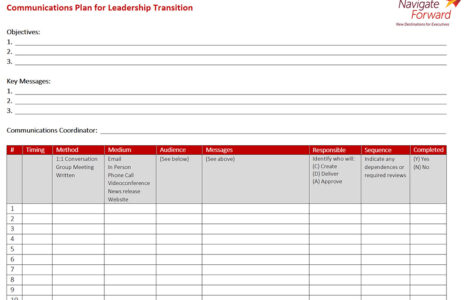Note: A version of this article first apeared in 2020.
For C-suite leaders and senior executives, landing a new opportunity takes time, clarity and dedicated effort.
How can you stay motivated and keep your executive job search on-track? We reached out to our network of executive recruiters and outplacement experts for advice on moving forward.

Marcia Ballinger
Cofounder, Ballinger | Leafblad
“There’s no more valuable thing than to listen to your outplacement executives.”
Set daily metrics. Ballinger describes herself as an “achiever” personality, one who finds motivation in tangible progress. She recommends having structure and daily metrics for the job search process.
“Your objective is to get a job. But, how do you stay whole, stay ‘achieving,’ if that may not happen for six months? Put that work-like structure around the job search: Today, I’m going to call three people, meet with two and link with five. Tomorrow, I’m going to write an article, do seven links and one meeting. It provides this constant set of achievements.”
Leverage outplacement support. For those fortunate enough to receive outplacement services, Ballinger stresses getting maximum value from these experienced professionals. “There’s no more valuable thing than to listen to your outplacement executives. Don’t second guess; don’t bypass; don’t discount that person. If you have a resource to help through these challenging times, that’s the greatest gift.”

David Lyman
Principal, Lyman Executive Search
“If you reach out and show empathy, that’s what you’ll get in return.”
Show empathy. One of the biggest changes since the advent of COVID-19 is a new emphasis on personal well-being. When facing new circumstances, part of staying positive and making solid connections is finding common ground on a personal level. It begins with empathy.
“If you reach out and show empathy, that’s what you’ll get in return. If you have the right mindset, then what you’re going to get out of the process is a positive outcome.”
Tap professional services firms. To find new opportunities, Lyman recommends connecting with those who advise family-owned and privately held companies, such as lawyers, accountants and business advisors. “Those are great resources because not every executive position goes to executive search; some companies try to do it themselves first.”

Jill Harmon
Executive Consultant, Navigate Forward
Partner Emeritus, Ballinger | Leafblad
“Be open-minded. Is there a way to help with a short-term project? A fractional job?”
Accept the situation. A first step for anyone in transition is processing the situation and the associated emotions. There’s no right or wrong timeframe, but it is important to adopt a positive mindset before meetings begin. Friends, family, outplacement counselors and even therapists can help.
“Jobseekers have to come to acceptance with the transition, because you can’t move on until you accept it. You need to be ready, to have a positive mindset, before you really begin networking and interviewing.”
Be open to new opportunities. Moving forward may not be a straight line from one full-time role to the next. While Harmon cautions executives to be selective about where they apply, she also advises keeping the door open to new ways of working. “Be open-minded. Is there a way to help with a short-term project? Or the possibility of a fractional job?”

Susan Rylance
Vice President of Growth & Talent, Fahren
“Make sure you can bring something new and innovative to the table—it’s crucial to landing that next interview.”
Broaden your networking. In addition to professional associations devoted exclusively to your profession or industry, Rylance recommends joining a broader group. Both forums will help candidates stay current with trends and expand your professional connections. She also sees power in cross-functional conversations as part of the job-search process.
“Make sure you’re talking to others within the organization: Marketing should talk to IT, talk to finance, because you’ll have to communicate with those individuals on the job and bring new ideas.”
Show your innovation. In senior roles, and in dynamic times, innovation is more critical than ever. Rylance emphasizes the importance of showing your experience and strategic thinking as part of the search process.
“Companies are looking for someone who can think outside the box and help them mold the business in a different way. Make sure you can bring something new and innovative to the table—it’s crucial to landing that next interview and next job.”

David Magy
Principal, Abeln, Magy, Underberg & Associates
“The news is reasonably depressing. Don’t leave it streaming on your computer.”
Limit news consumption. Staying motivated in a during difficult times requires more effort. Being intentional about your news and social media intake helps you stay focused. “The news can be reasonably depressing. Stop reading it—or read it once—but don’t leave it streaming on your computer.”
Plan for bad days. Magy believes it’s important to acknowledge upfront that there will be difficult days. He recommends giving close friends some forewarning that you will need their support, then reach out to them when challenges occur.
“Having those people available, and recognizing when you’re getting into that funk, is an important thing to do.”

Patti O’Leary
Executive Consultant, Navigate Forward
“This is not the time to put your job search on hold.”
Humanize your approach. Unexpected change can prompt a variety of reactions. It’s critical to allow yourself—and those you network with—some breathing space.
“People are going through a lot of things. It requires being positive, but at the same time, empathetic and flexible. Offering to help is positive; people appreciate the outreach. You can’t be tone deaf.”
Be proactive. With so much in flux, it can be tempting to take a breather when you’re in transition. O’Leary cautions against pausing the job search, even if open positions seem scarce.
“This is not the time to put your job search on hold. Even if you’re in an industry where things have slowed, they will open up at some point—and they might open up pretty aggressively. Networking and broadening your connections now is advantageous.”



